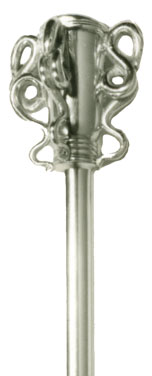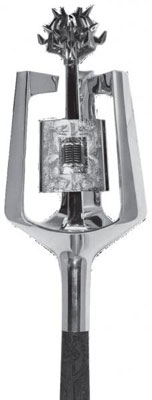
Gift from the Royal College of Physicians of London
In April 1954, Lord Walter Russell Brain, President of the Royal College of Physicians of London (RCP London), presented the American College of Physicians with a small silver scepter at the College’s Annual Session in Chicago. The scepter or caduceus is an exact replica of the caduceus carried by the President of the RCP London as an insignia since the College’s founding in 1518. The ACP Caduceus measures 26 inches in length and 17 ounces in weight and bears at its head the Arms of the Royal College of Physicians of London, supported by four serpents placed at the corners. The caduceus was given to ACP along with a scroll that stated, “The silver rod indicates that the President should rule with gentleness and clemency, unlike those of olden time, who ruled with a rod of iron. The serpents, the symbols of prudence, teaching the necessity of ruling prudently, while the Arms of the College placed on the summit, indicate that gentleness and prudence are the means by which the College is sustained.”
A Mace Worthy of Convocation
In 1962, Dr. Irving S. Wright was appointed by ACP’s Board of Regents to look into procuring a mace, suitable for use at the College’s Convocation Ceremony. The artist, A. G. Styles of the Garrard and Company, Ltd., of London, was engaged as silversmith, and sketches were prepared and approved by the BOR. After the selection of the design, the next choice was whether the shaft should be made of wood or silver. Dr. Wight’s wife, Lois, suggested the idea of obtaining a piece of timber from the famous Plane Tree on the Island of Cos to serve as the shaft. Dr. Wight mentioned this to Dr. Theodore J. Abernethy, Regent from Washington, D.C., at a Regents meeting. Dr. Abernathy, who coincidently was a close friend of the United States Ambassador to Greece, Henry R. Labouisse, half-jokingly suggested he might actually be able to obtain a piece of wood from Greece to serve as the mace’s shaft. Dr. Abernathy did not realize the Plane Tree on the Isle of Cos was regarded as a Greek national treasure and that wood from it was almost impossible to obtain.

The diplomatic process involved negotiations and letters between US Ambassador Labouisse, a member of the Greek Parliament for the Dodecanese Islands, the Mayor of Cos, the Greek Phytosanitary Service, the US Department of Agriculture, the US Information Agency, and the Voice of America. As Ambassador Labouisse wrote Dr. Abernethy, "In connection with your request for a piece of wood from the Island of Cos to be fashioned into a ceremonial mace, the Parliamentary Deputy from the Dodecanese Islands has promised to try to get a branch from an old plane tree near the site where Hippocrates practiced. As soon as we have it, we will send it to you." After some temporary delays, attributed to the lack of a phytosanitary certificate, a 5-foot 8-inch 45 pound log arrived in Washington, D.C., on March 20, 1963. A certificate accompanying the wood and signed by the Mayor of Cos, George Kaisserlis, attested to its authenticity.
The wood was treated for preservation at the Forest Products Laboratory of the U.S. Department of Agriculture in Madison, Wisconsin. Don Turano, a noted wood sculptor in Washington, D.C., designed and carved into the shaft the figure of Hippocrates discoursing to his students under the plane tree, with quotations from the Hippocratic Oath in Greek. The mace head is made of silver and gold, and the design consists of the twin serpents of Aesculapius, the Lamp of Wisdom, the Book of Knowledge and the Poppy, symbolic of medicine and its practice. The silver gilt ornament at the top of the spire represents the flames of the Torch of Progress. Around the base of the head are engraved the words from the first aphorism of Hippocrates: “Art is long, life is short."
Lost and Found
Each year the mace and caduceus would be used at ACP’s Annual Session Convocation, and between ceremonies, they would be returned to ACP headquarters, where they could be viewed by visitors. After Internal Medicine Meeting 1989 in San Francisco, the crates carrying both the mace and caduceus were apparently lost on their way back to Philadelphia. No one was able to find them. The Executive Office sent out a memo asking employees to search through all the returned crates in the hope that the objects had been returned but were misplaced. Unfortunately the College’s central ceremonial objects could not be found. At this point the College’s leadership made the decision to have replicas made of both objects to be used at convocation. While on the surface the completed copies looked nearly identical, the wooden shaft of the mace was neither decorated nor from the Isle of Cos; as it would be nearly impossible to again get permission from the Greek government.
Then, as the College was getting items ready to ship for Internal Medicine Meeting 1990, the crates holding the original mace and caduceus were found! At that point the decision was made that the original objects would remain permanently on display on the 9th floor of the College’s headquarters in Philadelphia. From 1990 until today, only the replica copies travel for Internal Medicine Meeting’s Convocation.

ACP’s Headquarters
The original mace and caduceus are on display on the 9th floor of ACP Headquarters and may be viewed when visiting the College.
Sources:
- Prepared by Eric Greenberg, based on materials from the Archives of the American College of Physicians
- July-August 1963 issue of the ACP Bulletin

